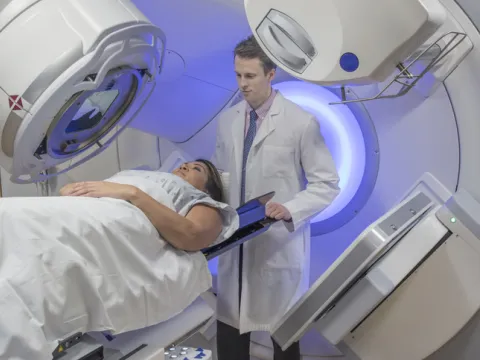- AdventHealth
D. Ashley Hill, MD, Medical Director of Obstetrics and Gynecology at AdventHealth Medical Group and Associate Director of the AdventHealth Graduate Medical Education Program's Department of Obstetrics and Gynecology, and AdventHealth family medicine physician Chantel A. Taylor, MD, published an article in American Family Physicians about dyspareunia in women. Defined as recurrent or persistent painful sexual intercourse, dyspareunia is a common condition that affects approximately 10 to 20 percent of women in the United States. While it can negatively affect women’s mental and physical health as well as their relationships, many who seek medical care for it report that they feel their concerns are dismissed. Left undiagnosed or untreated, dyspareunia can lead to sexual dysfunction, anxiety, depression, relationship distress and diminished quality of life.
Dr. Hill and Dr. Taylor encourage clinicians to understand the multiple risk factors for dyspareunia which include younger age, white race, lower socioeconomic status, depression, anxiety, low sexual satisfaction and a history of sexual abuse. In addition, women in the postpartum, perimenopausal or postmenopausal periods are also at increased risk as are those who have had a vacuum-assisted or forceps vaginal delivery, have had pelvic floor surgery or are breastfeeding. In addition, dyspareunia can occur with other conditions that cause pelvic pain, including fibromyalgia, irritable bowel syndrome and musculoskeletal disorders.
Clinicians should create safe and welcoming environments where they can take a complete sexual history and patients feel comfortable discussing their sexuality, including any symptoms they are experiencing and the location, intensity and duration of any pain. Physical examination is also critical to effectively diagnosing dyspareunia and should include visual inspection as well as sequential pressure with a cotton swab to assess for focal erythema or pain. In addition, a single-digit vaginal examination may be necessary to identify tender pelvic floor muscles, and a bimanual examination can assess for uterine retroversion and pelvic masses.
Causes of dyspareunia can be multifactorial and combining the patient history with the physical examination helps to determine the cause. Common diagnoses include inadequate lubrication, vaginal atrophy, pelvic floor dysfunction, vulvodynia, postpartum causes, vaginismus and endometrioses. Treatment focuses on the cause and may include lubricants, pelvic floor physical therapy, topical analgesics, vaginal estrogen, cognitive behavior therapy, vaginal dilators, modified vestibulectomy or onabotulinumtoxinA injections.
View the full document here.
Recent News

AdventHealth Graduate Medical Education Program Celebrates 50 Years
Growing from a family practice residency to 24 accredited programs, AdventHealth’s Graduate Medical Education (GME) program celebrates 50 years.

AdventHealth Performs Central Florida’s First Liver Transplant for Unresectable Colorectal Liver Metastases
In June 2025, AdventHealth Abdominal Transplant Surgeon and Surgical Oncologist Ryan Day, MD, worked with a multidisciplinary team to perform Central Florida’s first liver transplant for unresectable...

AdventHealth Neuroscience Institute First in Florida to be Recognized as a GammaTile Center of Excellence
GammaTile is the first and only tile-based radiation therapy for the treatment of
operable brain tumors. The AdventHealth Neuroscience Institute began performing GammaTile procedures in 2021 and was...

An AdventHealth Collaboration Explores the Impact of Microgravity and Electrical Stimulation on Muscle Cell Health in Space
Using a muscle lab-on-chip model aboard the International Space Station (ISS), AdventHealth Translational Research Institute’s Dr. Paul Coen has been working with a multidisciplinary team from the...

AdventHealth Neuroscience Institute Administers First Dose of Investigative NK Cell Therapy to Person with Alzheimer’s Disease
Under a single compassionate use Investigational New Drug (IND) authorization cleared by the U.S. Food and Drug Administration (FDA), the AdventHealth Neuroscience Institute worked with NKGen Biotech...

New Study Published in the New England Journal of Medicine Shows the Addition of Regional Nodal Irradiation Does Not Decrease Rate of Invasive Breast Cancer Recurrence in Patients with Negative Axillary Nodes Following Neoadjuvant Chemotherapy
Findings of the phase III, multicenter, randomized NSABP B-51-RTOG 1304 clinical trial were recently published in the New England Journal of Medicine with AdventHealth Cancer Institute’s Dr. Mamounas...

AdventHealth Study Exploring the Use of MR-Guided Focused Ultrasound (MRgFUS) to Disrupt the Blood-Brain Barrier for Treatment of Alzheimer’s Disease
Under the leadership of Dr. Valeria Baldivieso and Dr. Chandan Reddy, the AdventHealth Research Institute is the first and only site in Orlando offering the Exablate Blood-Brain Barrier (BBB)...

AdventHealth Research Institute Offers Phase II Clinical Trial of Etanercept for Treatment of Blast-Induced Tinnitus
Approximately 1 billion people throughout the world suffer from tinnitus (ringing in the ears), and it is the number one disability of those who serve in the U.S. military. The condition can disrupt...

AdventHealth’s Karen D. Corbin, PhD, RD, Contributed to New American Diabetes Association Consensus Statement on Liver Disease in Diabetes
Metabolic dysfunction associated steatotic liver disease (MASLD), formerly referred to as nonalcoholic fatty liver disease (NAFLD), affects about 70% of people with type 2 diabetes, placing them at...

AdventHealth East Orlando First in Florida to Earn Advanced Foot & Ankle Surgery Certification from DNV
AdventHealth East Orlando recently became the first hospital in Florida to earn Advanced Foot & Ankle Surgery Certification from DNV, a worldwide, independent certification body.

Recent Study on How Physical Activity May Boost Neurocognition in Late Adulthood Featured in the Medical Journal Age and Ageing
In a new article published in the medical journal Age and Ageing, AdventHealth Research Institute’s Dr. Audrey Collins shares the results of a recent study evaluating the impact of exercise on...

AdventHealth Research Contributed to New Method for Tracking Diet and Its Impacts on Human Health
Accurately determining food intake remains a challenge in nutrition research. A new study published in Nature Metabolism and co-authored by Dr. Corbin introduces a metagenomics-powered approach to...
